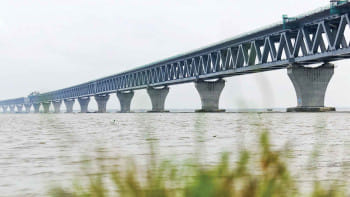Economists and their predictions: What lies beneath the illusion of simplicity?

When the World Bank cancelled its proposed funding (in the form of IDA credit support) for the construction of the Padma Multipurpose Bridge in 2012, it was decided that the bridge would be built with the country's own resources. In response, the general mood among the economists of the country was a pessimistic one. It was thought that, against the backdrop of the country's many issues of the time regarding income-expenditure balance, liquidity, foreign exchange reserve, and technical capacity, it would be prohibitively costly and even somewhat foolish to pursue the endeavour. But 10 years on, Bangladesh has retained its foreign reserves, maintained stable economic growth, and the overall socioeconomic development and, on June 25, 2022, inaugurated the Padma Bridge for public use. It is only the global fallout of the Russia-Ukraine war that is now straining some aspects of Bangladesh's economy.
The question now is: How should the predictions or the warnings of economists be evaluated? And why, in general, do forecasts not pan out the way they are thought to?
One of the most common shortcomings of the general art of prediction among economists is that the information we rely on draws on a theoretical framework based on past data and future expectations. Economists often speak in the language of optimal alternatives, given resource constraints. The process of prediction is essentially dependent on how one traces the expected changes in behaviour due to some change. It also depends on how one processes the past and the current information set, and also which information is included in the analysis. For example, in focusing on economic factors of a proposed change, one may overlook the non-economic factors, such as the resilience and aspiration around an expected event.
The subsequent economic development of Bangladesh meant that the country had a larger resource base at its disposal, which would not cushion the intensity of the tradeoff as predicted by economists. Moreover, it could have been predicted that, in anticipation of the construction of the bridge – which would link the southwest of the country to the northern and eastern regions and create new economic opportunities for the people – people would experience an aspirational shift which may affect their resolve and productivity. Spillover effects from increased growth in other sectors may propel continued growth and development. Of course, in the absence of evidence backed by data, these are only conjectures. However, if the language of economic analysis is one tradeoff in the face of many alternatives, these explanations should also be considered as plausible alternative scenarios when analysing the consequential impacts of a particular event. Moreover, the problem is that the probability of a rare event is most likely to be overestimated when the alternative is not fully specified.
Prediction is difficult because it involves imagining alternative future realities, which is by definition incompletely specified. Another obstacle is that, while it is easy to predict events that occur frequently, the same is not true for infrequent events. Feedback is a crucial factor for improving the accuracy of predictions. Eminent psychologist and economist Daniel Kahneman and psychologist Amos Tversky argued that whether or not professionals have a chance to develop intuitive expertise depends essentially on the quality and speed of feedback, as well as on the extent of opportunity to practise. Because long-term or infrequent events occur rarely, there is little chance for feedback and revision of intuition.
Two additional tendencies also need to be mentioned in this context. First, the tendency to search for and favour information in a way that supports one's prior beliefs, which is known as the confirmation bias in the parlance of psychology. Secondly, we have a tendency to substitute a difficult question with an easier one, in order to come up with an answer. When the occurrence of rare events requires us to think hard about alternatives that might play out in the future, and when we only have vague ideas about possible pathways, we turn to our tried and tested beliefs to come up with an answer which closely mimics the average scenario.
The famous economist John Maynard Keynes explained what it means to be an economist along these lines: "The master-economist must possess a rare combination of gifts.... He must be mathematician, historian, statesman, philosopher—in some degree… He must study the present in the light of the past for the purposes of the future. No part of man's nature or his institutions must be entirely outside his regard. He must be purposeful and disinterested in a simultaneous mood, as aloof and incorruptible as an artist, yet sometimes as near to earth as a politician."
Keynes' words aptly capture the difficult job an economist faces. The natural biases that all humans possess make it even harder. Predictions are fallible, and perhaps speaking in a language of intellectual humility would help in communicating that fallibility.
Mahir A Rahman is a research associate at the Bangladesh Institute of Development Studies (BIDS).

 For all latest news, follow The Daily Star's Google News channel.
For all latest news, follow The Daily Star's Google News channel. 







Comments